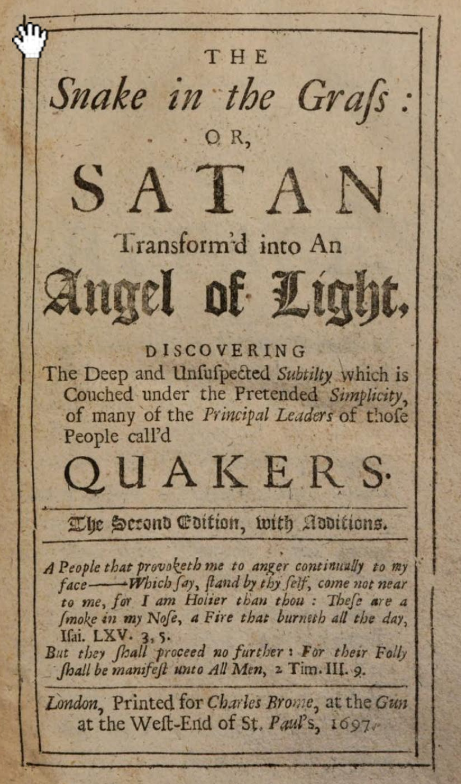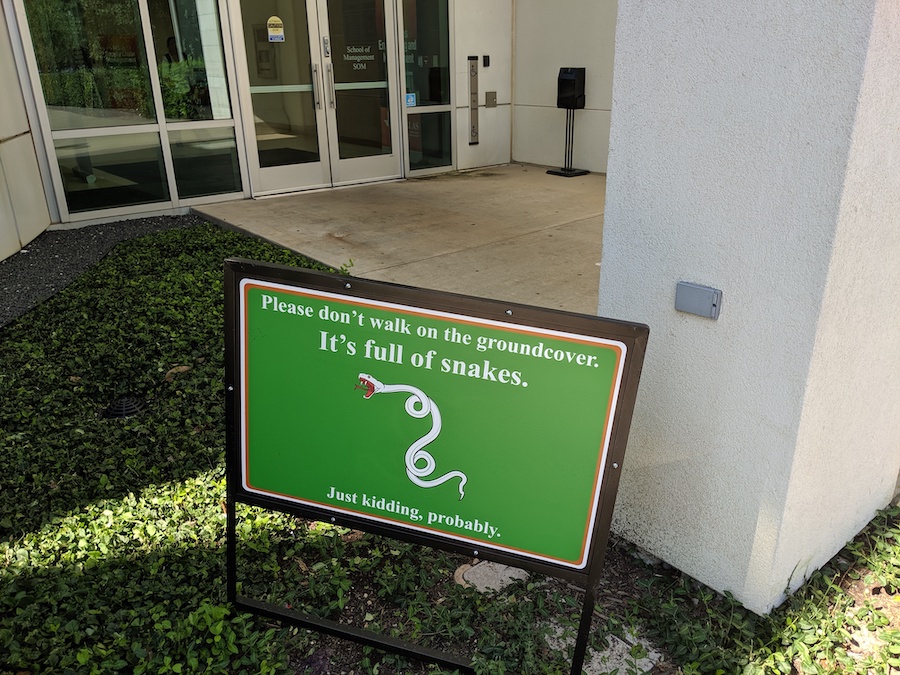Snakes in the grass, probably
« previous post | next post »
On the UT Dallas campus:
Merriam-Webster defines "snake in the grass" as "a secretly faithless friend", and says the the "First Known Use" was in 1696, but doesn't tell us who or where.
The OED explains that snake is
2.b. Used to denote some lurking danger, suspicious circumstance or person, etc.; esp. in the phrase a snake in the grass (after Virgil Ecl. iii. 93 Latet anguis in herba).
with these citations:
1611 W. Barksted Hiren sig. C6 O could this diuell my soule so transforme, That I must eate that snake in him did lurke.
1659 Haslerig in T. Burton Diary (1828) IV. 337 Consider what a snake lies under this fair Declaration.
1677 A. Yarranton England's Improvem. 101 Hold, hold, you drive too fast; there is a snake in the Bush.
1696 C. Leslie (title) The snake in the grass; or, Satan.
1709 T. Hearne Remarks & Coll. (1886) II. 173 There is a Snake in the grasse, and the designe is mischievous.
1881 S. Evans Evans's Leicestershire Words (new ed.) Sneck-i'-the-gress, a sneak; a traitor; a treacherous deceiver.
1907 E. Gosse Father & Son xi. 281 He did not scruple to remind the Deity of various objections to a life of pleasure and of the snakes that lie hidden in the grass of evening parties.
1978 J. Irving World according to Garp xiv. 271 We were playing in Dallas, when that snake in the grass..came up on my blind side.
The full title of Leslie 1696 is "The snake in the grass: or, Satan transform'd into an angel of light. Discovering the deep and unsuspected subtilty which is couched under the pretended simplicity of many of the principal leaders of those people call'd Quakers." Or in the original printing:

The title page is enough for me to wonder whether the 1696 usage really evokes the "secretly faithless friend" meaning — it seems more to be more congruent with the OED's "lurking danger" gloss, though I guess "SATAN transform'd into an Angel of Light" counts as an apparent ally that's secretly hostile and dangerous.
The Virgil source is the couplet
Qui legitis flores et humi nascentia fraga,
frigidus, O pueri, fugite hinc, latet anguis in herba.
translated by J.B. Greenough as
“You, picking flowers and strawberries that grow
so near the ground, fly hence, boys, get you gone!
There's a cold adder lurking in the grass.”

Edith Maxwell said,
June 19, 2019 @ 8:18 pm
So Quakers are "smoke in my nose"? As a Friend of thirty years (and holder of a long-dusty PhD in linguistics, also a former card-carrying faithful reader of this blog), this warms my heart. Pretended simplicity! Love it.
Sorry, freely admit to diverging from the topic of the blog. Off to crosspost to the (FB page) Association of Bad Friends, a group devoted to Quaker-related humor.
[(myl) Your Bad Friends may also appreciate Mr. Leslie's opening words:
THE Controversie with the Quaker-Dissenters, has not been pursu'd by the Church of England with the like Zeal and Pains as those against the Presbyterians, Independents, and other Dissenters; because the Quakers were not so Considerable, either for their Learning, or for their Influence upon the Publick Revolutions, which the others caus'd both in Church and State.
But their Numbers (whether increas'd by being so neglected) are now really Formidable, I mean for the many Souls Seduc'd by them (for I speak not now of Temporal Considerations;) they not only swarm over these Three Nations, but they Stock our Plantations abroad.
It is wholly for the love of Souls, that I have enter'd into this Controversie. And therefore, to do Right to All, I have made a Distinction between them, in the very Title.
I name many of their Principal Leaders; because I have great Charity for the generality of the Ignorant sort of them, some of whom I know to be very Honest and Well-meaning Men, and Devout in their way, and who suspect nothing of the Depth of that Mystery of Iniquity, wherein they are Blindly, and Implicitly led.
]
John Swindle said,
June 19, 2019 @ 10:21 pm
"Quakeriſm is but one Branch of Enthuſiaſm, tho’ the moſt ſpread and Infectious of any now known, in this Part of the World," the author says; "Therefore let the Frightful and Stupendous Proſpekt of Quakeriſm, Guard others from other ſorts of Enthuſiaſm, that ſeem more Plauſible; but ſpring all from the ſame Stock; and draw after them the ſame Damnable Conſequences." Available free from Google Books as a roughly 450-page ebook.
AlexB said,
June 20, 2019 @ 12:46 am
Ah, the 17th century, when typography was wild and free
Keith said,
June 20, 2019 @ 1:53 am
The first thing that struck me was the similarity of the sign to the Gadsden flag.
https://en.wikipedia.org/wiki/Gadsden_flag
[(myl) Since the message is basically "Don't tread on me", I'm sure that's not an accident. In that context, there's this other (and more serious) visual pun:
]
Bloix said,
June 20, 2019 @ 1:43 pm
The snake at least in the anti-Quaker tract is not dangerous because of its bite but because of its craftiness ("subtilty"). Here is Genesis 3 in the KJV translation:
3 Now the serpent was more subtil than any beast of the field which the Lord God had made. And he said unto the woman, Yea, hath God said, Ye shall not eat of every tree of the garden?